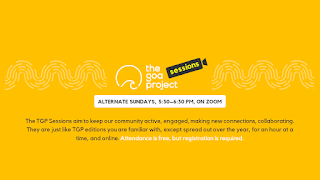You want to help, you’re limited to being able to offer only your time online or on the phone, but you don’t know how to get started. Here are some tips from Dina, Bala, Neha, and me, based on our own experience long ago running tsunamihelp.blogspot.com and allied and subsequent efforts.
YMMV and all that.
Collaborate.
We believe in the power of one. But we would also strongly recommend collaboration. (Which, if you come to think of it, does require that one person to make the first move.
Many like-minded
folks working together make for a whole greater than the sum of its parts. Even
if members each have modest followings in the social medium you choose, you can
reinforce each other’s posts and increase reach by each one amplifying to their own audiences.
A collaborative effort can also be the foundation of
life-long friendships. Trust us at least on this.
Most of the rest of this is about such collaborative work.
So, what next?
Step 0.
Look around for people who have already formed groups to do
things like collect and sort information. Volunteer to join them. There are
many already out there. Follow their methods and ignore the rest of this post.
(Folks who are running groups like this, please leave a comment so others can
find you.)
If that doesn’t work out, for whatever reason, perhaps you
could start a group of your own. In which case you might want to read these
tips.
What do you want to do? Will you list fundraisers? (What
kind? Help for individuals? Organisations raising money?) Help people find home medical
help? (Source oxygen tanks + ventilators etc? Medicines?) Source medicines?
Hospital help? Help people who are quarantined?
It makes sense to look around and see what is needed.
There are three broad types of info needs we see right now:
emergency, persistent, and clarity.
• ‘Emergency’ would be all the cries for help we see where
people require oxygen or hospital beds NOW or they will die.
• ‘Persistent’ or longer-term needs would be reliable (and
current) sources for O2, medicines, lists of beds available, medical help at
home, meal services, and similar.
• ‘Clarity’ is needed because there are many, many
questionable and troubling rumours and superstitions being passed around as
facts, which need debunking, and many good sources of sound info and
can-apply-right-now tips that need amplification.
Each requires slightly different skill-sets.
Decide: Which type will your group handle?
(It may make sense to focus on one and do it well rather
than flounder as you try to do it all. Of course, if you have a large group,
you may be able to pull off many things at once. We did, that time, with
TsunamiHelp, because we had several hundred people in the effort.)
A collaborative blog would probably work better for the ‘Persistent’
type of need. Your effort could be a constantly updated repository or
aggregator.
‘Emergency’ needs could prob be done with a blog, but may be more efficiently done by working as individuals but coordinating.
‘Clarity’ needs could be met by individuals supporting the efforts of fact-checking sites and healthcare professionals; donate to the, re-share their posts.
So, step 1.
Decide exactly what you want to do.
Then put it into words.
A clear ‘mission statement’ helps everyone focus. (Mission
statements are for internal use, meant to inspire your team and give it
direction. It isn’t necessarily the name of your effort or your hashtag.)
Step 2.
Think through the various tasks that will need to be done,
and then divide you team accordingly.
For instance (with titles, some of which we used):
• Collect information: ‘Seekers’
• Sort info: ‘Sifters’
• Verify info: ‘Checkers’
• Clean up and format info: ‘editors’
• Make it accessible in multiple ways (including to people with
disabilities) and on different platforms: ‘Translators’; ‘Specialists’
• Delete info that is outdated or sensitive: ‘Cleaner-uppers’
(This is important. Someone required a hospital bed and shared a phone number;
the bed is got (or worse, is not needed any more), but the person who asked is
still getting calls at a time when they have other needs. Or a supplier is out
of stock, but still getting besieged by requests. And we’ve seen women who
posted numbers getting dickpicks and lewd calls. Never post private numbers in
public if you can help it.)
• Answer requests: ‘Call Centre’; ‘Helpline’
• Onboard new volunteers: ‘HR’; ‘Trainers’
• Solve tech issues: ‘IT’; “Fixers’
• Coordinate all this (no mean task): ‘Managers’
• Your effort is very popular and the media wants to chat? Have ‘spokespersons’ with agreed talking points.
Step 3.
Put people in charge of each of these functions; we suggest
working in shifts with handover protocols.
Bring new volunteers in quickly (a shared document with
goals, methods etc would be great) but ensure that they're on board with your
central goals AND methods. If you can hear out people who disagree with your
goals/methods, fine, but it's cool to shrug, thank them for their time and wish
them godspeed elsewhere.
How do you run this?
Some thoughts.
• You’ll need an HQ, a ‘war room’ or ‘conference room’ which could be something like WhatsApp, Telegram, Signal, or a Google Group.
• Keep a private page updated with what one finds / verifies
etc for the group’s internal use. You could use Google Groups, which lets you
have stuff in threads, or a private Facebook group with posts under which new
info is added as comments. A platform that doesn’t let you easily go just to
the threads that matter will became a morass in no time.
• And of course maintain a public page / site / social media
handle updated for your target audience. This could be a blog, a Google Drive
(or similar) page, Google Sites, a Twitter or Instagram or whatever is most comfortable
and hospitable for your team and your audience.
• Use whatever social media you’re comfortable with, and see
how you can use (or repurpose) the new tools you have, like Zoom, Google Meet,
and similar, Whatsapp, Signal, Telegram, and similar.
Repurpose?
For example, we used a blog as a collaborative publishing
platform, supplemented that with things like using Yahoo Chat (R.I.P.) as a war-room,
Skype (you remember, Zoom people?) as a call centre, Flickr (THE photo-sharing site of that time) as a
missing persons album, and so on. None of these were designed with those uses
in mind, but they worked for us.
• Whatever you use, it’s important that not everyone should
post to the public page — could lead to duplication — so systematic process and defined roles
are important.
A word on self-care.
The work you’re doing is important, but you won’t be able to
continue to do it if your body or mind get too tired, too stressed. You won’t be doing anyone any good if your mind of body break down.
DON’T TRY
AND DO THIS ALL YOUR WAKING HOURS. Take breaks. Cut out completely for some
time. Chat with the folks you live with, or loved ones further away. Cuddle you
pets or talk to your plants. Eat properly. Listen to music. Watch a movie. Go
down internet rabbit holes as you pursue your other interests. SLEEP.
A word on conflict.
Resolve conflict early. Any group of people will have
conflicts. In a world in which so much is going to hell in a jet-propelled
hand-basket, people will be tense. It’s important to solve disagreements
quickly, without rancour. Maybe someone in the team is good at calming people
down? Put that person in charge of conflict resolution.
p.s. For other ways you can help, this post might give you some ideas. This kind of action can have huge value, as Anshumani Ruddra has shown with this tweet, and the very many folks emulating him (see the quote tweets).
Update: Some of us are doing Dhan Daan again. More here.





